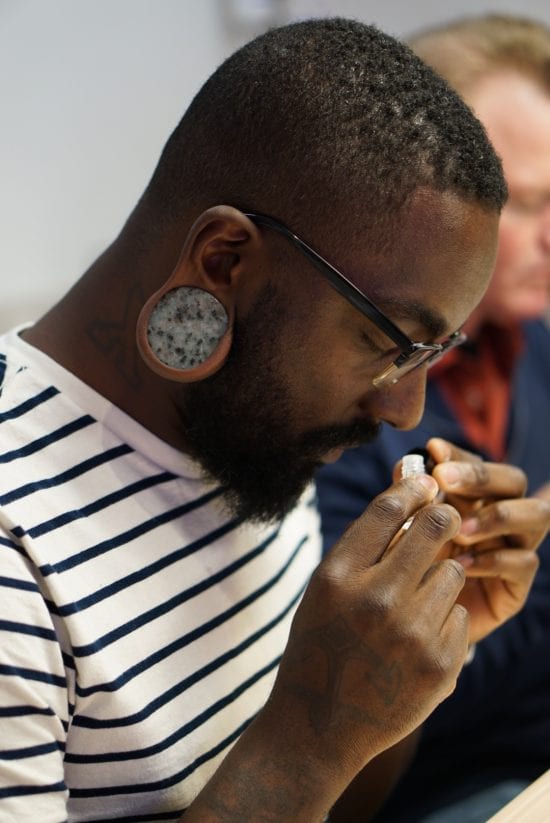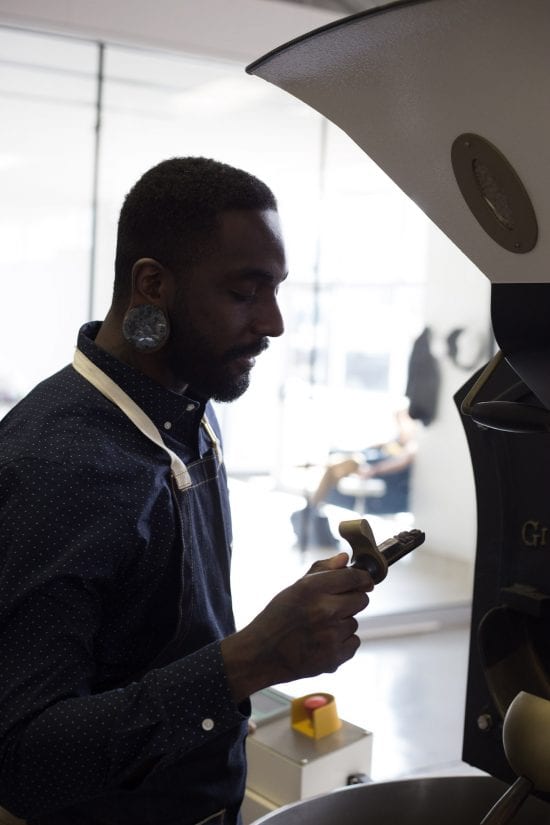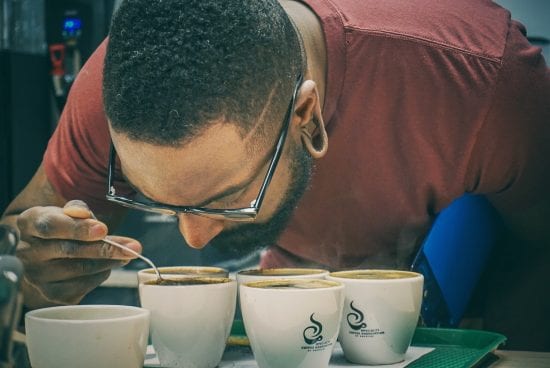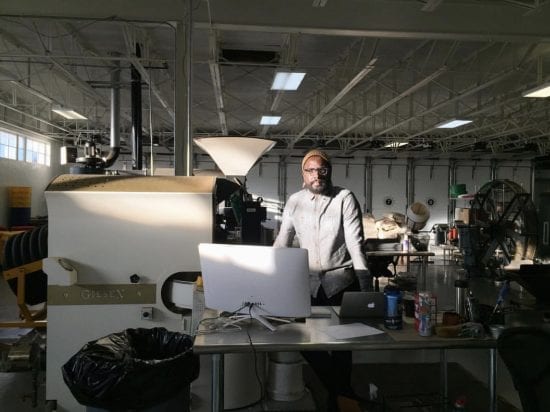
Before coffee, Cameron was playing music in awful bands and was lucky if he could afford to keep the lights on. Now he’s the director of coffee operations for Revelator Coffee in Birmingham, Ala.
BY ASHLEY RODRIGUEZ
BARISTA MAGAZINE ONLINE
Cover photo by Kevin Farmer
Cameron Heath got into coffee because he needed a job, but he ended up finding a career and a calling. Cameron is the director of coffee operations for Revelator Coffee in Birmingham, Ala., and he talks with us about being a leader, how he approaches roasting, and much more.
Ashley Rodriguez: Let’s talk about your life pre-coffee. What were you doing and what career path did you envision for yourself?
Cameron Heath: I spent my pre-coffee days in Raleigh, N.C.. Working dead-end jobs, putzing my way through three quarters of community college and spending my weekends playing in awful bands. I don’t think I had a vision for my life at that point; if I was able to keep my lights on and afford cheap Chinese food on a regular basis, I was doing well. Needless to say it was a glamorous life.

AR: How did you get into coffee? What was your first coffee job?
CH: My dive into coffee was purely out of necessity. A couple of weeks ago a production worker asked me, “Why did you get into the coffee industry?” I replied, “I needed a damn job!” I was working in another industry and lost my job, so I just took the summer off. When I was nearing the end of my funds, I hopped on Craigslist and found a pack/shipping gig at Stockton Graham & Co.. My first coffee job was barely coffee focused; my only interaction with coffee was when I put bulk bags in boxes and stacked boxes of syrups and smoothies. Again, I lived a life of luxury.
AR: When did you get into roasting?
CH: After an extensive three-month tenure in the shipping area of Stockton Graham & Co., I transferred over to a roasting apprentice roll. I am very aware that I lucked out in this regard; my running joke is that I only got the job because I was their only choice. Shout out to Brandon Rigs of Rising Star and Brady Kirby of Stockton Graham for allowing me to mess up their day on the regular.
AR: You’re now in a leadership role now at Revelator—what is that like?
CH: It’s wild. In the past as the only production roaster I would roll in at 5 a.m., roast up some beans, cup some coffee, work on the roaster, and roll out at 2 p.m. Super easy life; I reported to one person and no one reported to me, so as long as I roasted coffee and maintained quality, my day was solid. Fast forward to present day, and I have a team to lead, a space to maintain, and a company culture I have to help foster. So going from being the dude who breezed in and out to being a part of bigger discussions and more forward facing is both overwhelming and gratifying.

AR: What skills have you had to develop, and what have been some of the challenges/successes you’ve experienced?
CH: In a leadership role, I think the skill that has helped me the most is leading by example. Don’t let the J.Crew fool you—I’ll still go out on the production floor and fill some bags. I know from a personal standpoint that it’s hard to follow directives from someone that won’t get their hands dirty from time to time, and honestly a part of me still enjoys it since hands-on, labor-intensive work is how I got my start in the industry.
The biggest challenge I have faced is unifying a pretty diverse team. Birmingham has an interesting workforce in regards to the coffee industry, so navigating how to bridge the gap between someone that is green to the coffee world and someone that is more senior has its pitfalls.
AR: How do you approach coffee? Do you have a philosophy or way of thinking about roasting coffee?
CH: Kind of feel like my approach and my philosophy are slightly contradictory … but whatever!
I approach coffee in the same way I approach cooking. Every great meal has layers of complexity that isn’t built quickly, and a meal can easily be over-worked; the middle ground between the two has worked the best for me. My personal philosophy on roasting is kind of a modified version of a Rob Hoos (read his book, it’s life changing) approach I’ve called “the art of restraint.” Minimal adjustments on a profile so that a coffee has a chance to speak for itself, and if it happens to have a fruit-juice consistency, even better. What’s the point of sourcing coffee to honor growers if you mask it with your roast?

AR: What have you learned from your previous jobs?
CH: Never be too good to something—nothing is below your pay grade.
Getting to a certain level and getting too comfortable is a real-deal fear of mine. Knowing how to hustle is a muscle, and if you don’t use it, you’ll lose it.
AR: What feels important to you?
CH: I won’t get on a soapbox about it, but equality in coffee across the board is an obvious issue. It seems like when the industry is on a decent path to some sort of even footing, something happens to offset it. I’m not going to pump fake and say I am in any way a social justice warrior, but I will call bullshit when I see it. Women, POC, queer, trans people have been and continue to be taken advantage of and overlooked in the coffee community.
Once the dust settles from the current state of things, I would love to see how the coffee community will tackle our engagement issue when it comes to underserved communities.
AR: What’s the best piece of advice you’ve ever received?
CH: Ten years ago, an old boss told me the most infuriating and inspiring thing ever:
“Cameron, you’re going to be great when you start to care.”
Such a simple statement that really struck a chord with my inner perfectionist. The worst part about it was how right he was because I spent most of my early 20s not caring about much.

If something is worth your time, care too much. Let it be all consuming, exhausting to think about but super effective. It’s a great self check for what you’re doing and others.
AR: What’s on your plate for the future?
CH: This year I have some plans to travel to origin, which is a big deal in itself, but it’s a bigger deal for me considering where I came from. If you told little Cameron in Garner, N.C., “Hey kid! Work on your Spanish, you’re going to Honduras in 20 years.” He would reply, “Honduras … South Carolina?” With that said, I’m working on my Spanish this year too.
AR: Something I think about when I think about you is radical honesty … when I interviewed you for the Matchbook Coffee Project, you mentioned that you love getting feedback. Why is that? More generally, what is your work style like, and what keeps you motivated?
CH: Feedback is a motivator—the only person I want to be better than is myself yesterday. Everyone has their blind spots when it comes to roast; one thing that is pleasant to me might not be so great for someone else. I mean, if you hop in my DMs with a “I wish your coffee didn’t suck,” you most likely wont get a response, but objective feedback is always appreciated. This is also a way I can honor the growers that worked way harder than I did to produce coffee. If I’m not roasting coffee to the best of my ability, I shouldn’t be doing it.
You always hear about the first cup of specialty coffee that changed people’s viewpoint of coffee. I remember mine was a washed Ethiopian from Counter Culture … it was like lemonade. But I want to be that life-changing coffee provider. If someone somewhere was like, “My first experience with specialty coffee was some washed Ethiopian from Revelator and it just changed how I saw coffee … thanks homie,” I’d be pumped about that.
AR: What do you do in your spare time?
CH: Since I turned 30 I’ve been battling my urge to spiral into an early midlife crisis by working out. Been doing a lot of running, working my way up to a half marathon by the middle of this year. It’s a good way to see the city and clear your head after thinking about S-curves for eight hours straight.
I’ve noticed an uptick in foliage in my apartment these days, so I guess I’m a plant person now? Being able to keep something alive for a while is a good feeling.
Still forcibly watching episodes of Lost, worst show out.

